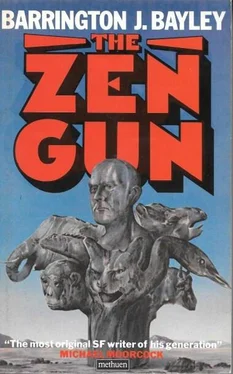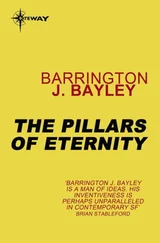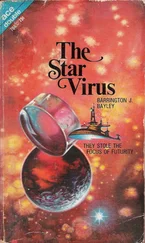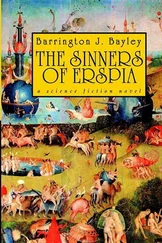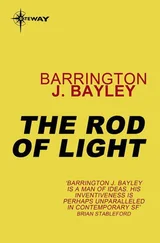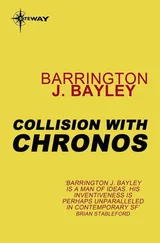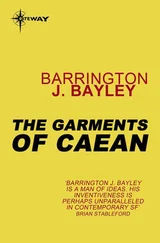De Cogo had to press the point. “Please give me a direct answer, Torth.”
Nascimento shrugged.
“Please, you must tell me, Torth. You know how the law regards this. A mammal has emotional sensitivity—it can be civilised. But an intelligent reptile, or raptor—it has no feelings! It’s forever savage and a danger to others!” Officially such creatures could never be regarded as sentient, no matter what their intellectual capacity.
Nascimento giggled. “I’ve got to admit an intelligent snake remains a most uncivil sort of being, not really a person at all. But when you run a museum you feel the need to be comprehensive —you follow me?”
“So it’s true,” de Cogo sighed.
Smiling, Nascimento began to reminisce. “Adplanting is so simple it can even be applied to primitive orders, like arthropods. I might as well admit—I’ve amused myself with that as well. Boris was my favourite. A wolf spider.”
“Intelligence at the service of a spider?” De Co go was bewildered. “But what’s the point of that? A spider doesn’t have a real mind—it’s just a behavioural machine!”
“Well, I was bored. That’s why I gave him the genes to be big—he was the size of a pony. Except that an arthropod that large can’t even stand up unmodified, so, surgical engineering—a prosthetic internal skeleton! I wish I could show him to you, but I’m afraid to say there was a mishap and he escaped. He had the craftiness to scamper well away from here, of course, the rascal. I hear he became the terror of the Kolar district before he was eventually destroyed!” Nascimento gave a high-pitched laugh.
“You’re mad,” de Cogo whispered to himself. He cleared his throat. “Torth, you know I’m here in an official capacity. I’ve tried to tell you before that you’re going too far. This time—”
“This is an ancient institution,” Nascimento interrupted, “and petty laws are passing affairs. We’re not bound by them here. We have a longer perspective.”
“ Everyone is bound by them, Torth,” De Cogo stopped, aware he did not have the other’s attention. Torth was bending over the chess board vacated by the robots, smiling at the unfinished game. Then his fingers moved to the keys and switched a few pieces round.
“Poor Crinklebend never wins,” he explained. “Just thought I’d give him a leg-up. Now, what were we saying? Ah yes, rules and regulations. My dear old friend, how can you be serious? This isn’t Diadem, it’s Escoria Sector. Imperial edicts aren’t much more than hopeful advice here. Besides—” Nascimento poked a finger at the ceiling—“according to what I hear there’s a rebellion brewing up there. The Empire looks likely to be pushed right out.”
“Even if that does happen, do you imagine the rebels are going to let the region descend into lawlessness?”
“Oh, they aren’t Biotists, are they?” Torth asked anxiously.
“No, I don’t think so.”
“Good. Anyway, no one’s going to take any interest in us. It’s a funny thing, you know, how the meaning of the word ‘Earth’ has changed. It’s used today in a biological sense—‘whole-Earth-Biota.’ But actually it refers to a planet. This planet, Lopo. This is Earth , remember?”
“Yes,” said de Cogo vaguely. It scarcely occurred to him to make the association. It was as if “Earth” was two different words that sounded the same. “What has that got to do with anything?”
“Everything,” Nascimento told him airily. “This is the forgotten original world, a total backwater. Nobody ever comes here, so what makes you think the rebels will, even if they do win? And as the governing council you claim to represent is almost as impotent as Diadem herself, what I’m saying is I can do anything I like, really. So stop moaning at me, Lopo!”
With those words Nascimento rose to his feet, and adopting the manner of one who has disposed of a troublesome importuner, sauntered from the room.
The curator’s words of that afternoon had struck terror into Pout. It comforted him not at all that the visitor had tried to come to his aid: Pout knew that Nascimento would not be stopped by anyone else’s opinion. His only hope of survival appeared to be for the curator to forget his decision.
He felt extra terror, but also surprise, therefore, when de Cogo once again appeared before him that evening. The inspector looked him over, compassion in his pale blue eyes.
“Poor half-monkey,” he murmured. “No mother, no father—what a substitute Torth has made! Try not to blame him—I think his reason went a long time ago. Well, at least I can do something to alleviate your suffering.”
Stepping to the wall, he slid back a panel Pout had never known existed. In the ceiling the signal light went out.
“Come. Your bars are gone.”
Pout cringed. He could not believe what this man seemed to be offering him; it was a trick. Looking at the woebegone creature, de Cogo was suddenly reminded of another experiment of Nascimento’s, the birdman. Lacking voice, unable to articulate language in either spoken or written form, this unfortunate knew only one mode of expression: the C melody saxophone. He played it like an angel whenever he wanted to communicate, uttering tunes and brilliant cascades of notes instead of sentences, trills and arpeggios instead of words. Nascimento had claimed this was a sophisticated form of birdsong, and that the musician was a man-blackbird he had (illegally but unrepentantly) fused. Suspicious at the lack of any physical chimeric signs (though the birdman was rather gawky), de Cogo had discovered the truth. The “birdman” was a pure human Nascimento had raised from birth, using accelerative growth hormones. The reason why he was speechless was that he had been systematically denied any opportunity to learn language. Music, in which he received intensive training, had been his only permitted form of communication. Nascimento had even resorted to putting the growing child in deep freeze between music lessons, to guard against non-melodic imprinting. He regarded the experiment as a resounding success: the speech centre, a left hemisphere brain function, became untrainable. The left hemisphere, the site of intuitive abilities including music, emerged as the only channel for meaning.
Indignant at seeing a first-class citizen imprisoned, de Cogo had obtained his freedom. Presumably he still wandered the Earth somewhere, as a tormented minstrel, able to convey the most rarefied feelings but not a single fact.
But he doubted if he could persuade Nascimento, in his present mood, to see reason in the case of Pout. He beckoned. “I am your friend. I will help you to freedom.”
Pout recalled the way de Cogo had spoken for him earlier. Cautiously, hopefully, he allowed himself to be wheedled from the corner. He passed through where the invisible bars had been. There was no pain.
He was standing on a different part of the floor!
His blood raced. It had been so long!
“Put this on,” de Cogo told him gently, holding out a yellow garment with a bib-like front attached to short trousers. Pout pawed at it. Eventually, at de Cogo’s instructions, he managed to fasten it on him. Then he stood awkwardly, shoulders bowed, swivelling his eyes from side to side, wondering what to do. He would have liked to be able to hurt his rescuer, to injure him or even kill him somehow, but he was not physically strong and he was afraid to attack him.
“Follow me,” said de Cogo crisply. Pout shuffled after the inspector; who led him through a long corridor, and then through a low-roofed gallery he vaguely remembered.
Then he turned left and they emerged onto a timber veranda. A warm breeze blew on Pout. Ahead of him, savannah-like grassland stretched to the horizon. The sun was mellow, hanging over the scene like a burnished lamp.
Читать дальше
